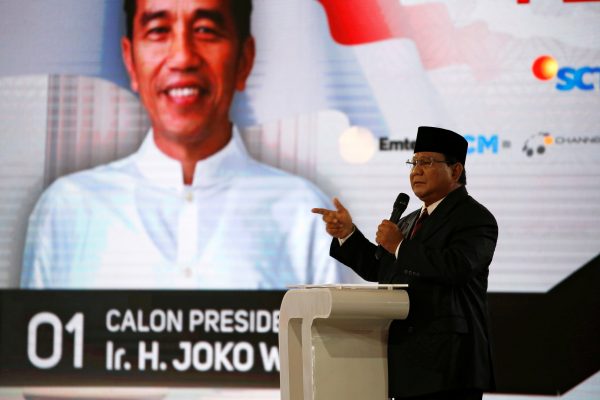Opinion polls released by the most professional survey firms all show Jokowi with a comfortable lead in the run-up to the election. On Wednesday 17 April the presidential elections will, for the first time, be held concurrently with elections for the national parliament and for legislatures in Indonesia’s provinces, cities and districts; all told, 193 million voters will be able to choose from among 245,000 legislative candidates.
But they’ll only be able to choose one of two men to be their next president — and they’re the same two who faced off last time. Once again, Jokowi’s challenger is the populist strongman and former general, Prabowo Subianto, son-in-law of Indonesia’s authoritarian-era President Suharto.
Voters’ choices are limited because Indonesia’s electoral laws include a ‘presidential threshold’, whereby presidential aspirants must gain the support of a coalition of parties controlling 20 per cent of the seats in the national parliament or 25 per cent of the popular vote to be eligible to stand.
Indonesians are increasingly critical of the presidential threshold, which enables party powerbrokers to keep the field closed to newcomers. Indonesia’s open party list system for choosing legislative candidates, meanwhile, contributes to a rampant culture of vote-buying at the grassroots. After the election, we can expect renewed discussions about whether Indonesia’s electoral system is encouraging the variety and quality of candidates demanded by an increasingly diverse and sophisticated electorate.
Indonesia’s challenges need to be seen in perspective. These elections are occurring at a time when democratic political systems across the Asia Pacific are caught in the global tide of scepticism about democratic norms and institutions. Indonesia’s own neighbourhood has recently been the stage for coups, crackdowns, and crimes against humanity.
Despite worries that religious identity politics are coming to dominate Indonesian politics, when it comes time Indonesians want much the same things as voters the world over: jobs, services, and security. Jokowi’s popularity, despite the opposition’s attempts to undermine confidence in him by appealing to religious tensions, owes much to his unremitting focus on delivering tangible benefits to voters.
It’s thus reasonable to see Wednesday’s election as another milestone in a success story for both democratisation and sound economics. After the 1997–98 financial crisis laid waste to the economy, successive generations of technocrats have overseen prudent macroeconomic management and laid the fiscal groundwork for politicians to woo voters with new government programs. In Jokowi’s case this has meant bankrolling a nationwide infrastructure program and putting some flesh on what were, until recently, the bare bones of Indonesia’s social safety net.
The picture is less positive when Indonesia’s political development is benchmarked with what the country can, and should, be achieving if leadership were more principled. In this week’s lead article, Liam Gammon argues that while Jokowi still represents the best option for Indonesia on Wednesday, he’s not the risk-taker that Indonesia needs to fix the country’s corrupt and sclerotic political institutions, bureaucracy and law enforcement apparatus.
Under Jokowi, he writes, ‘institutional reform and human rights languish in the too-hard basket’. The President’s cautious approach to politics has seen him reluctant to go out on a limb for reformist initiatives, instead hoarding his political capital to spend on his signature development programs.
More concerning still is what Gammon and other observers have interpreted as the increasingly illiberal climate under Jokowi. This trend has much to do with factors out of the president’s control, but some of it is due to his own treatment of political adversaries. When forced into a political corner, Gammon writes, the government has shown that it ‘is not above resorting to hard-knuckle tactics and legal harassment to reinforce the President’s electoral position‘.
Meanwhile, Jokowi’s opponent, Prabowo, has ramped up his campaign to discredit the election commission (KPU), with allegations of vote-rigging and ‘massive, structured systematic cheating’. This is a reversion to the form of Prabowo’s last challenge to Jokowi when he also cried foul in the face of electoral defeat and tried to insinuate grounds for challenging the electoral outcome. KPU has admitted problems with the voter list and pledged to work continuously on updating it until election day. The Election Supervisory Board (Bawaslu) has backed KPU. While the election process has not been free of problems, there is no evidence of systematic fraud.
Even his critics would acknowledge that whether Jokowi leaves office this year or at the end of a second term in 2024, he will have a good story to tell on Indonesia’s economic development. It would be a pity if the president’s more enduring legacy is erosion of the hard-won gains of Indonesian democratisation in the pursuit of political advantage. But certainly, whatever the problems, that legacy is in much safer hands with the cautious Jokowi than with the populist Prabowo.
The EAF Editorial Board is located in the Crawford School of Public Policy, College of Asia and the Pacific, The Australian National University.

